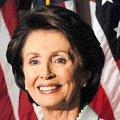Although she didn't run for office until she was in her mid-40s, Nancy Pelosi was born into politics. The seventh child and only daughter of Thomas and Anunciata D'Alesandro talked about growing up in a political family at a ceremony naming a street after her in her hometown of Baltimore, Maryland. "I was born and raised in Baltimore, where my father was mayor, and we were raised in a family that was devoutly Catholic, deeply patriotic, extremely proud of our Italian heritage, extremely proud of that, and in our case, staunchly Democratic," she said. Campaigning was practically a family tradition. One of Pelosi's brothers was also elected mayor of Baltimore. And veteran Democratic pollster and consultant Celinda Lake, who advises Pelosi, says young Nancy learned vote-counting, taking care of constituents and other political skills as a child.
"Politics was certainly not something that was new to her. I don't know if she ever aspired to be arguably the most powerful woman in the United States today." After college, Nancy married Paul Pelosi and moved to his hometown of San Francisco, California.
The two have five children, born within a six-year time span, and eight grandchildren.
Pelosi was 47 when she launched her first campaign, in a special election for a seat in Congress. But the future speaker was active in California politics during the years she focused on raising her children.
"She had been a community activist, and even before she ran for political office herself, she had risen through the ranks to be one of the most powerful women in California politics," said Lake. "She had been the head of the California Democratic Party, and that was at a time when women did not run political parties, and when the California Democratic Party was one of the most powerful parties in the country." Pelosi has represented California's eighth district, which includes most of the city of San Francisco, since 1987. She made history 20 years later, when she was elected the first female Speaker of the House of Representatives.
As she wielded the Speaker's gavel for the first time, Pelosi was acutely aware of what her election meant to other women who aspire to run for office. "For our daughters and granddaughters today, we have broken the marble ceiling," she said. Political analyst Larry Sabato of the University of Virginia describes Pelosi as the most powerful woman in American history.
"And I am not forgetting about influential first ladies, but there is a difference between power and influence," said Sabato. "The Speaker of the House has enormous powers within Congress and under the American constitution. So, she has great authority and she has used it to the hilt in her time as Speaker, and particularly since she has had a Democratic president she has been able to accomplish a great deal." One of the things Pelosi has accomplished as Speaker is something Democrats had been trying to do for more than 70 years: pass sweeping health care reform legislation. The reform will extend health insurance to more than 32 million currently uninsured Americans.
Lake says Pelosi's role cannot be underestimated. "Other people wanted to cave in, when people wanted to say, including a very powerful man in our party said, 'Let's just do children's health care and let's come back at it another day', she said, 'No, this country needs health care reform, we are going to take on the insurance industry, we are going to get it done.'" Republican political strategist Terry Nelson agrees that the Democratic Speaker was key to passing health care, but points out that Pelosi is a polarizing figure.
"You know she is viewed across the country as an ideological figure, her unfavorable rating is usually in the high 40's to low 50's, which, for a speaker of the House is really, really extraordinary," said Nelson. "I mean Speakers of the House tend to be, they are obviously important figures, but they tend not to be extraordinarily well-known across the country. With Nancy Pelosi, a lot of people know who she is and they have strong feelings about her." Pelosi makes no secret of her feelings about issues that come before Congress.
She has long been an advocate for human rights around the world. She has fought to improve China's human rights record, attempting to link trade to human rights standards. She's also been a leader in efforts to win autonomy for the people of Tibet. Some analysts say that Speaker Pelosi and President Barack Obama complement each other, with her tough, behind-the-scenes way of getting things done, and his gift for inspiring public speeches. The two still have a lot more they want to accomplish together, including financial reform, immigration reform and climate change legislation.
But first, Pelosi must try to hold on to the Democrats' current majority in the House of Representatives. Voters will cast ballots for all 435 seats this November. If Republicans do win back a majority, Pelosi will no longer be Speaker, but her place in history will be secure as the first female speaker, and the one who helped push health care legislation through Congress.

